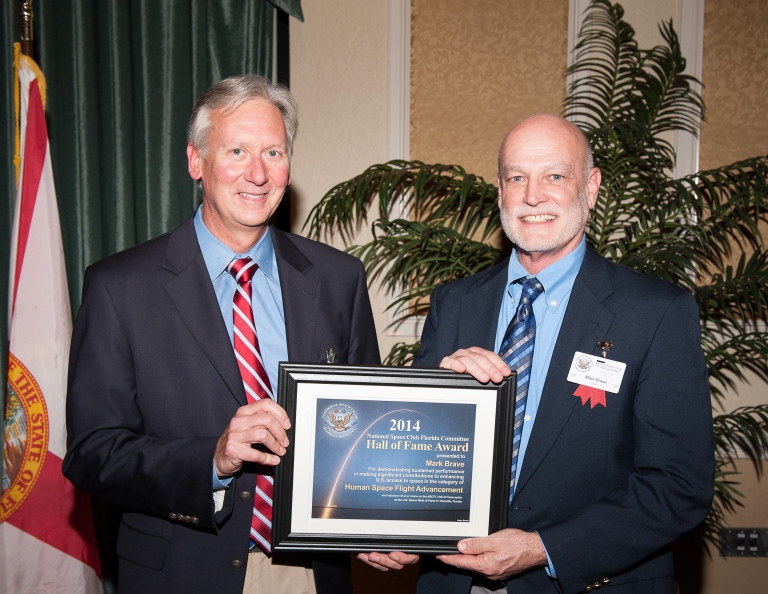School of AAE alum Mark Brave (BSAAE'73) receives National Space Club Florida Committee 2014 Hall of Fame Award
| Event Date: | January 6, 2015 |
|---|
 Purdue University School of Aeronautics and Astronautics alumnus Mark Brave (BSAAE’73) received the National Space Club Florida Committee 2014 Hall of Fame Award for his significant contributions in Human Space Flight at a ceremony at the Radisson Hotel in Cape Canaveral, Florida on November 12, 2014. Mark was recognized for his sustained performance leading teams responsible for solving some of the most demanding technical and operational human spaceflight ground processing challenges, and for his exceptional contributions to the direct advancement of human sub-orbital, orbital, or beyond orbital spaceflight technology.
Purdue University School of Aeronautics and Astronautics alumnus Mark Brave (BSAAE’73) received the National Space Club Florida Committee 2014 Hall of Fame Award for his significant contributions in Human Space Flight at a ceremony at the Radisson Hotel in Cape Canaveral, Florida on November 12, 2014. Mark was recognized for his sustained performance leading teams responsible for solving some of the most demanding technical and operational human spaceflight ground processing challenges, and for his exceptional contributions to the direct advancement of human sub-orbital, orbital, or beyond orbital spaceflight technology.
His career at Kennedy Space Center spans NASA’s Space Shuttle and Spacelab Programs, the International Space Station (ISS) Program and, since 2012, the Space Launch System (SLS) Program. Mark is respected as a valuable and valued contributor, colleague, peer, task leader, manager, and chief engineer.
After his graduation from the School of Aeronautics and Astronautics, Mark began his career working with communications satellites, transitioning to human space flight as an Orbiter auxiliary power unit systems engineer and subsequently, a Shuttle payload processing engineer where he earned the reputation as a highly-reliable, go-to engineer and engineering manager.
Mark has regularly led teams tasked to solve significant, high visibility, complex technical and operational challenges. With the arrival of International Space Station cargo elements in the late 1990s, his contributions became notably exceptional. During International Space Station launch site ground processing, the day-in/day-out demand for lifting and handling operations peaked significantly and Mark was tasked with refreshing the processes, procedures, and practices to train more engineers to safely lead these operations. He led the proactive implementation of the team’s improvements and instilled an increased attention to personal accountability for lifting and handling operations.
With this area of emphasis resolved, Mark accepted responsibility for the Shuttle payloads fluids processing operations which was entering a challenging phase. Under his leadership, his fluids group prepared for and performed fluids processing for the International Space Station cargo elements that employed new technologies: 1) precise “mixing” of the “flight water” for the pressurized modules, 2) hazardous oxygen line testing and flight fills, and 3) hazardous ammonia servicing for element cooling systems. Moreover, his fluids team performed spacecraft hypergolic fueling and cold flow operations for NASA Launch Services Program’s spacecraft.
These opportunities and experiences prepared Mark for service as a chief engineer, and in 2007, he became the Boeing payloads Chief Engineer. As Chief Engineer, he was in charge of the technical aspects of programmatic commitments, technical supervision of engineering staff and board chair for risk, material review, and material evaluation review boards. He held this position through February 2013, at which time NASA ended the contract with Boeing due to the retirement of the Shuttle.
After completing Shuttle closeout activities, Mark began his current work as Senior Systems Engineer on the Space Launch System (SLS) Core Stage (CS) program, part of a Boeing contract with NASA to design and build the largest rocket ever created to take humans into deep space, such as Mars. His role includes planning to test fire the rocket’s main engines at the Stennis Space Center in Mississippi prior to launch at the Kennedy Space Center.
Photo, above: Mark Brave (right) receives National Space Club Florida Committee 2014 Hall of Fame Award.
The National Space Club Florida Committee is one of three regional committees of the National Space Club in Washington, D.C. intended to provide information on space activities. For more information on the National Space Club Florida Committee, visit: http://www.nscfl.org/
